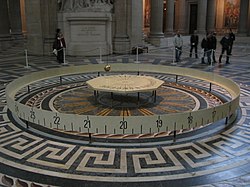
Back الزمن في الفيزياء Arabic زمان (مفهوم فیزیکی) Persian Temps (physique) French 物理学における時間 Japanese وقت (فزڪس) Sindhi இயற்பியல் காலம் Tamil Fizikte zaman Turkish Thời gian trong vật lý Vietnamese
| Time | |
|---|---|
Common symbols | t |
| SI unit | second (s) |
Other units | see unit of time |
| Dimension | |
| Time |
|---|
 |

In physics, time is defined by its measurement: time is what a clock reads.[1] In classical, non-relativistic physics, it is a scalar quantity (often denoted by the symbol ) and, like length, mass, and charge, is usually described as a fundamental quantity. Time can be combined mathematically with other physical quantities to derive other concepts such as motion, kinetic energy and time-dependent fields. Timekeeping is a complex of technological and scientific issues, and part of the foundation of recordkeeping.
- ^ Considine, Douglas M.; Considine, Glenn D. (1985). Process instruments and controls handbook (3 ed.). McGraw-Hill. pp. 18–61. ISBN 0-07-012436-1.
© MMXXIII Rich X Search. We shall prevail. All rights reserved. Rich X Search

